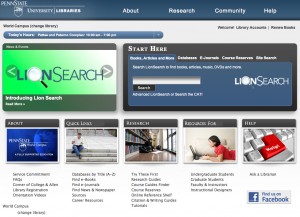

In my experience as a student at Penn State, the University Libraries have played a major role in assisting with my coursework. Living outside the United States, and not being able to visit any of its physical campuses, I first thought that accessing the library would certainly be a complicated process. I later found that my first impression couldn’t be further from the truth.
Penn State Libraries portal provides an intuitive environment to facilitate online searches of academic materials by students. The website contains a series of search parameters (author, year of publication, ISBN number, etc.) that can help you accurately locate any book or publication you are trying to find. Based on the way you adjust the search fields you can “widen the net” of the potential entries and consequently the variety of results you get related to the focus of your research.
Whether writing a research paper, or simply investigating academic sources to further your knowledge on a particular topic that you find interesting, Penn State Libraries are at your disposal 24 hours a day, every day of the year. The editorial resources of the library are absolutely stunning and contain more than 5.8 million books, not to mention the tens of millions of articles and technical publications that are readily accessible through hundreds of databases that collect them in digital format.
During my semesters as a World Campus student I have made extensive use of the University collections and the underlying technology that made them effortlessly accessible even for a student living overseas. Based on my particular experience, I would like to provide the following tips:
- Check the library resources as often as possible. No matter the course you are taking during the semester in progress, I can assure you that all the knowledge is not packed in your recommended textbooks. Many times consulting other materials and publications, which your textbook refers to, can actively contribute to increase your understanding of the material you are studying.
- Try to narrow your search (at least initially). If you already know what you are looking for (e.g. you already know the book title or the author’s name), it is clear that your search parameters would have to basically include that relevant information. That said, it might happen that the book is a collective work or that you may only need a particular edition of a volume, in which case it might be necessary to broaden the spectrum of search by filling in additional fields. I have to insist again that the web search engine is highly flexible and configurable, adapting perfectly to the user needs.
- Widen your search parameters. If a precise and limited search is not feasible (for example because you want to study the troubled relationship between the system of criminal justice and juvenile offenders), then you could conduct a search based on keywords like “young offender” and “criminal justice system” and combining multiple databases oriented to the study of legal aspects such as JSTOR or Lexis Nexis Academic. In this case, and in order to limit as much as possible the likely avalanche of results, you could narrow the search, for instance, by focusing it on recent publications and articles that date back to no more than a decade ago.
- Don’t hesitate to ask if you need some support. As indicated previously, the search engine is extremely flexible and conforms perfectly to your particular needs. Nevertheless, it might happen that you don’t find what you are searching for, that you need some advice regarding the use and access to Penn State collections, or need some help to deal with a technical issue you might be experiencing. The Penn State Libraries website offers a nice solution to all those situations and contexts. You can find a bunch of tutorials, search guidelines (some general and others specifically tailored according to the stuff you are studying), troubleshooting FAQS, and even have the ability to consult directly with one of the many, very helpful, librarians.
These tips barely cover the many benefits you can get by checking the extensive collections and academic resources the University has made available to students. I suggest you visit the World Campus Library homepage for further information, you won’t regret it.



